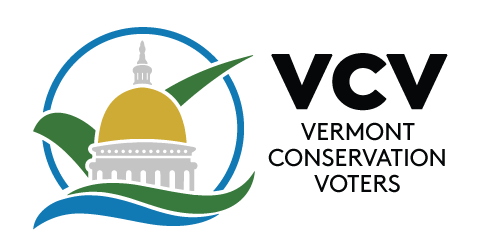On Jan. 24, 2018, Vermont Conservation Voters and partners released the 2018 Vermont Environmental Common Agenda of legislative priorities at a reception in the Cedar Creek room of the Vermont State House.
The Common Agenda is collectively shaped by a range of environmental organizations across Vermont working on initiatives affecting our shared natural resources, the integrity of our communities, and the health of all Vermonters.
“At a time of increasingly high stakes, we have the opportunity in Vermont to show the country that investing in the health of our environment means providing our communities with greater opportunities for dignity and justice,” said Lauren Hierl, political director of Vermont Conservation Voters (VCV). “A wide variety of groups have come together to call on Vermont’s legislature to take substantial action to invest in clean water, protect our families from toxic chemicals, and take meaningful action on climate change. We can’t continue to kick the can down the road when it comes to protecting Vermont’s environment and the health of our communities.”
VCV and partner groups will advocate for the following priorities in the 2018 legislative session:
- Establish a long-term clean water funding source and Clean Water Authority to successfully implement funding;
- Enact policies to better protect Vermont’s health by reducing exposure to toxic chemicals in drinking water and consumer products;
- Grow the climate economy by helping all Vermonters transition to efficient and clean energy solutions; and
- Maintain healthy, intact forests, and support our rural economy by strengthening landowner incentives and Act 250 to address impacts to forests.
Partner groups signed onto the Common Agenda include: Vermont Conservation Voters (VCV), Vermont Natural Resources Council (VNRC), Vermont Public Interest Research Group (VPIRG), Conservation Law Foundation (CLF), Vermont Chapter of the Sierra Club, Toxics Action Center Campaigns, Audubon Vermont, Lake Champlain Committee, and Lake Champlain International.
“With the federal government abdicating their responsibilities to care for our environment, it is critical for Vermont lawmakers to step up and enact policies that support a clean, healthy environment – which is essential to a thriving economy. This year we must take action to clean up water pollution, maintain healthy forests, and build our clean energy and outdoor recreation economies,” said Brian Shupe, executive director of Vermont Natural Resources Council.
“Clean air, clean water, safe food – these are the values that are under attack right now in Washington, DC,” said VPIRG Director, Paul Burns. “But it’s not enough to oppose these attacks. Vermont leaders must step up and prove there’s a better way forward.”
“2018 is the Year of the Bird marking the 100 anniversary of the Migratory Bird Treaty Act. Passing the Common Agenda’s priorities would be a fitting tribute to the Act; and would advance bird conservation by protecting habitat through funding the Vermont Housing and Conservation Trust Fund, conserving large forest blocks in Act 250 proceedings and addressing water quality,” said Jim Shallow, managing director Audubon Vermont.
“We’ve seen community leaders bring forward incredible solutions for our climate, economy and health on the local level, ” said Shaina Kasper, Vermont State Director at Toxics Action Center. “We continue to take strides forward, with successes like winning clean drinking water for residents in Bennington. But we know these fights aren’t over. Now we want to see our legislators make those changes happen statewide.”
Each year, Vermont Conservation Voters publishes the Common Agenda of legislative priorities and works side-by-side with elected officials to address priority issues. VCV assesses lawmakers’ leadership, support, or opposition to Common Agenda priorities in VCV’s annual Environmental Scorecard, released at the end of each legislative biennium, which voters can utilize to review lawmakers’ voting records on environmental initiatives.
Founded in 1982, Vermont Conservation Voters works to elect environmentally-friendly candidates to public office, and then holds elected officials accountable for the decision they make affection our air, water, communities, land, and wildlife. To learn more, please visit: www.vermontconservationvoters.org or follow us on facebook.com/VermontConservationVoters and on Twitter at @VoteGreenVT.
